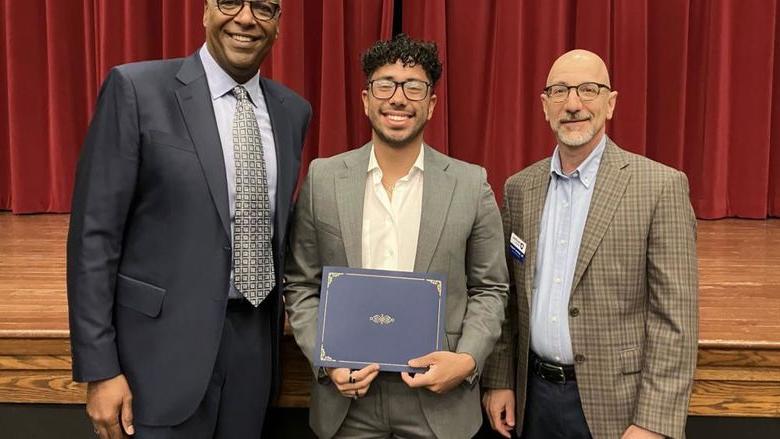
High school students demonstrate the content they are learning through their enrollment in the College-Bound STEM Academy.
UNIVERISTY PARK, Pa. — Penn State Abington and KleinLife celebrated their partnership last week that improves access to science, technology, engineering and math (STEM) education for high school students, primarily from George Washington High School in the School District of Philadelphia. At the Futures in Focus: College-Bound STEM Academy Showcase, leaders from the three organizations and education advocates were joined by state Sen. Jimmy Dillon and students to highlight its benefits.
The College-Bound STEM Academy allows Abington faculty, students, and alumni to teach college-level classes at KleinLife in Northeast Philadelphia. Most of the 100 students who have taken these classes attend George Washington High School, which is nearby. A dual enrollment program allows the students to earn college credits through two modules taught by Abington faculty.
“This program really is the embodiment of Penn State’s land-grant mission to provide educational resources to our communities. We are deeply committed to expanding high-quality dual enrollment programs that improve the access students have to rigorous coursework and equitable opportunities in higher education. We are very proud of this program and grateful to our partners for collaborating with us to make transformational education more accessible to more students,” said Margo DelliCarpini, vice president of Commonwealth Campuses and executive chancellor at Penn State.
DelliCarpini served as the chancellor at Penn State Abington when the program launched.
“This pioneering program, funded by KleinLife and delivered by Penn State Abington's dedicated instructors, is designed to ignite a passion for science, technology, engineering and mathematics in the bright young minds of our community," Stephen B. Klein, KleinLife chair, said. "Our mission is to not only enhance academic achievements but also to lay the foundation for future success in the rapidly evolving global tech landscape.”
"By empowering today's students in need and tomorrow's innovators, Penn State Abington and KleinLife are bridging the gap between high school and college with dual enrollment in advanced math and STEM courses. Our students are benefiting greatly with this program," Antonios Pitsakis, the assistant principal at George Washington High School, said.
Michael Kagan, director of the program and associate professor of physics at Abington, explained that the diversity of the community surrounding KleinLife spills over into enrollment in the program.
“It’s not uncommon for a class to have students representing a dozen countries with some of them joining us just days after arriving in the United States. Oftentimes, they speak math or Python more fluently than English,” said Kagan, who oversees a teaching team of 16 people.
"Introduction to Electrical Engineering Concepts," "Introduction to Basic Programming without Coding," and math enrichment STEM courses were taught this spring. The dual enrollment options for the students were Math 140 (four-credit Calculus I) and CMPSC 132 (three-credit Computer Science II).
Dual enrollment allows high school students to take college courses and earn both high school and college credit. Credits earned can be applied to a Penn State degree and are part of one transcript recognized at all Penn State campuses. These credits may also be transferred to another college or university.
Dual enrollment can give students a jumpstart on successfully transitioning to higher education and into careers. It is an evidence-based practice that improves student outcomes, and it can reduce the time and money invested in earning a college degree.
About Penn State Abington
Penn State Abington provides an affordable, accessible and high-impact education resulting in the success of a diverse student body. It is committed to student success through innovative approaches to 21st-century public higher education within a world-class research university. With more than 3,100 students, Penn State Abington is a residential campus that offers baccalaureate degrees in 25 majors, accelerated master's degrees, undergraduate research, the Schreyer Honors College, NCAA Division III athletics and more.






